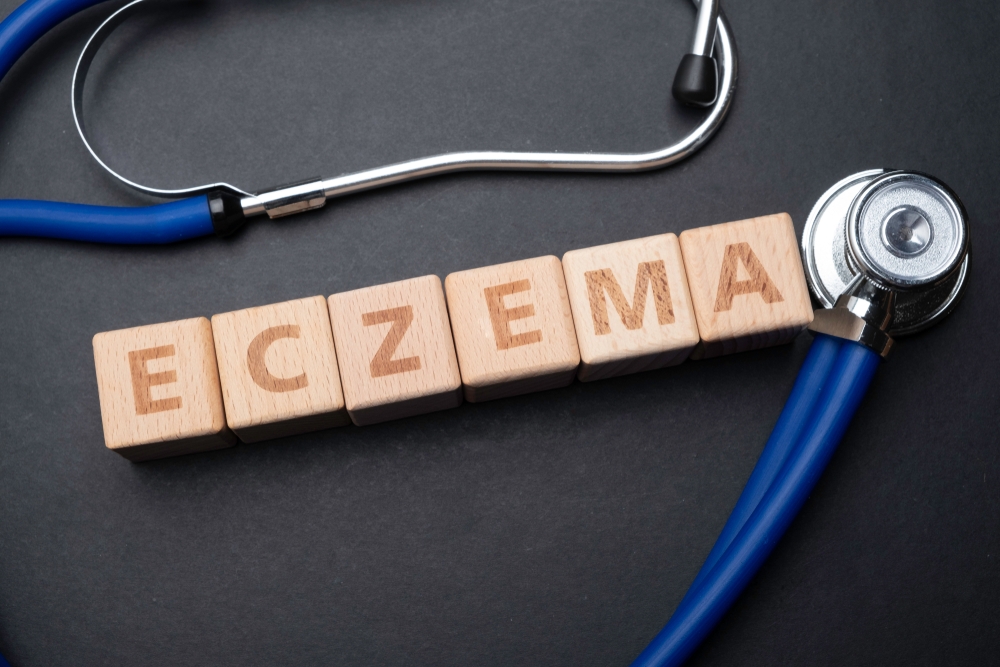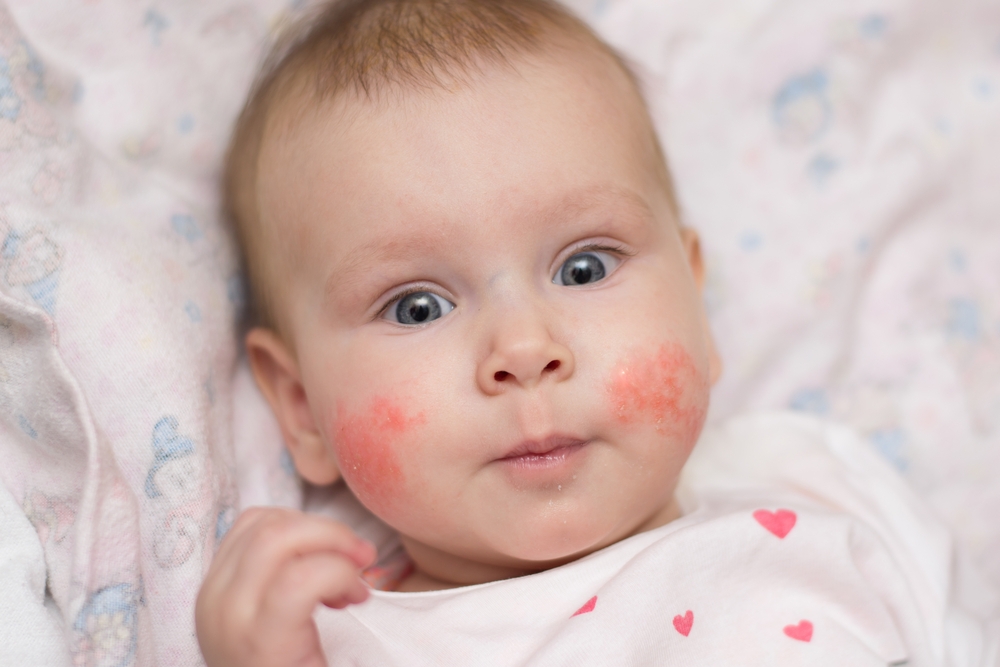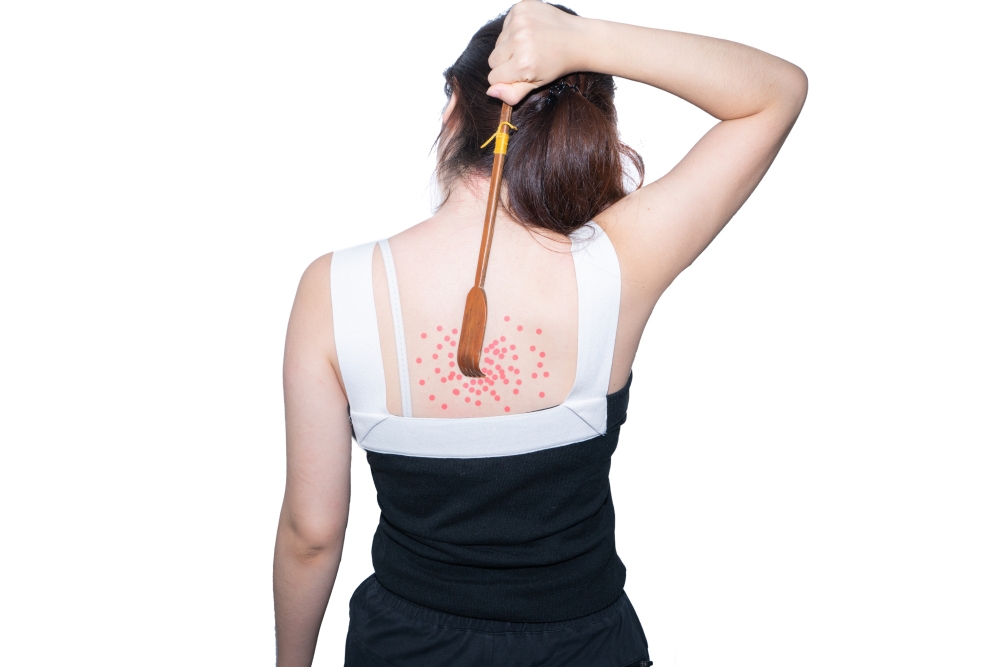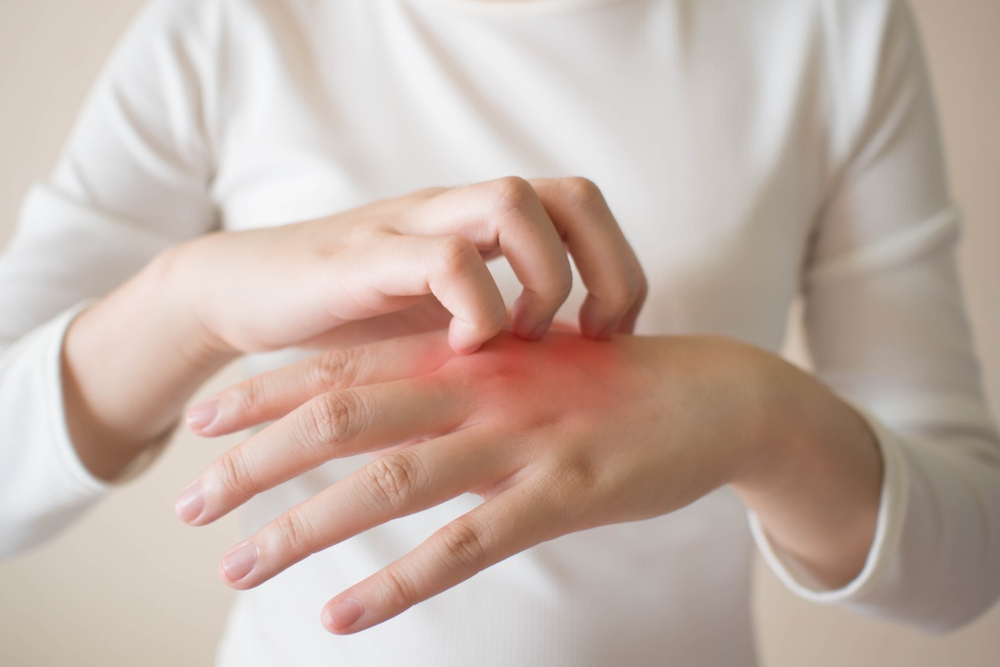
1. Eczema is what?
Eczema is a kind of skin disease caused by many factors. Rash has various forms and usually has obvious exudation tendency, so it is called [eczema].
This is an ancient disease, which has long been described in ancient medical allusions. It is usually accompanied by obvious pruritus and is prone to recurrence, causing troubles to patients’ lives.
2. Is the eczema of small babies the same as that of adults?
Infantile eczema is a common skin disease in infants. It is a special type of eczema.
Under the influence of traditional Chinese medicine (traditional Chinese medicine), it is usually commonly known as milk tinea among the people, but in fact it is not a tinea disease, and it belongs to an allergic skin disease like eczema, that is, allergy.
However, unlike eczema, infantile eczema usually decreases and disappears with age, and only a small number of people continue to develop into adulthood.
3. Why do you get eczema?
Eczema is a delayed allergic reaction with complicated etiology. Generally speaking, there are two types. One is external factors, such as dust in living environment, cold or hot climate, sunlight, animal fur, certain specific plants, chemical products, etc. There is also an internal factor, such as chronic digestive system diseases, gastrointestinal dysfunction, infection, or just excessive fatigue, tension and insomnia, which may induce eczema.
4. Are people with eczema also prone to other allergic diseases?
When a person with eczema-like rash shows that he will suffer from the disease every time he contacts a specific thing, but there are only a few things, we usually think that this is a contact dermatitis. As the thing causing allergy is very single, it is only necessary to avoid contact.
However, eczema is different. Eczema patients are very sensitive to many, many different allergens. Therefore, an eczema patient often has allergic rhinitis due to pollen, and even a few people will suffer from asthma.
How does eczema occur?
Eczema is a very common skin disease in outpatient clinics, with a prevalence rate of about 7.5% in China and 10.7% in the United States.
The term eczema used to represent all chronic skin allergies of unknown pathogenesis. However, with the development of modern medicine, we found that some of them were actually caused by a hidden single allergen that we had not found before, so we only need to remove the allergen and will recover quickly. We classified this part of patients as contact dermatitis.
Another part was found to be a genetic physical problem, which we classified as atopic dermatitis. Therefore, with the development of medicine, eczema is actually becoming less and less.
6. Is eczema contagious?
Infectious diseases are infectious diseases produced by pathogenic microorganisms or parasites infecting the human body, while eczema is an allergic reaction of its own, so it is not contagious.
In life, no matter talking, sharing tableware and bathing utensils, or even touching the rash of the patient directly, it will not be infected, and the patient’s family members do not need to take any protective measures.
If you have eczema patients around you, you should not be on guard or even discriminate against them, which is totally unnecessary.

7. Is eczema hereditary?
When a person with eczema-like rash is accompanied by asthma, allergic rhinitis, And has a very obvious family history, for example, parents or brothers and sisters suffer from eczema, we usually hope that he will check whether the IgE and eosinophils in the blood are higher than ordinary people in the hospital. If they are indeed elevated, then he is probably actually an atopic dermatitis patient.
The rash of such a patient is probably a genetic problem, so his offspring may also inherit such an allergic constitution. However, not all eczema has a genetic tendency.
8. Can eczema become cancerous?
Eczema itself does not become cancerous. But breast eczema and breast eczema-like cancer (Paget’s disease) look very similar, although they are actually two completely different diseases.
Breast eczema usually occurs in breast-feeding women and gradually disappears after stopping breast-feeding. If it continues to develop, we should be on guard against Paget’s disease.
However, at the beginning of the onset of the disease, because the appearance is too similar, it is sometimes necessary to go to the hospital for a pathological section examination to identify it.
9. Eczema looks like what?
Eczema is usually symmetrically distributed left and right, and the skin lesions are very diversified. In the acute phase, there are usually many dense small red papules with the size of rice grains, and occasionally there are small blisters. After being caught rotten, serous fluid continuously exudes. Therefore, it is called [eczema]. This period is the most itchy, and even the severe ones can’t sleep.
After the acute phase has passed, exudation will disappear, leaving only small papules and peeling scales. If scratching and bleeding occur, scabs will also occur, and pruritus is still obvious.
In patients with chronic eczema, after long-term scratching, the rash often fuses into pieces, thickens, and turns brown red or black. At this time, the pruritus is not persistent, but paroxysmal.
10. Which diseases do eczema need to be identified with?
First of all, if the allergen is single and heals quickly after avoidance, it is actually a contact dermatitis rather than eczema.
Secondly, chronic recurrent eczema should be distinguished from neurodermatitis. The latter rash is a whole piece of rough skin, which is not as diverse as eczema. The onset is related to mental factors. Therefore, recurrence is very frequent. If you are slightly in a bad mood, nervous and angry, you will relapse.
Finally, it is also the most common eczema on hands and feet, which should be distinguished from tinea manus and pedis.
11. Will eczema grow all over the body?
Generally speaking, the rash of eczema does not run everywhere, but is relatively fixed. In some patients, it may not even change its position for 20 years.
In the acute phase, the rash of some patients will become larger or more, but these changes are usually very slow and limited.
Only a very small number of people will develop generalized eczema, and a considerable part of this is related to inappropriate use of excessive hormones.
12. Why is eczema easy to grow in spring?
Spring is a season with high incidence of all allergic diseases/allergies. The temperature difference between morning and evening in spring and autumn is large, and frequent alternation of cold and heat is a stimulus to eczema patients.
Compared with autumn, spring is the season when flowers bloom, and pollen floating in the air often causes allergy to sensitive people.
Therefore, spring is a difficult season for patients with eczema, asthma and allergic rhinitis. They need to reduce going out or wear masks to avoid inhaling pollen when going out.
13. Is the red pimples on my feet eczema?
After many people found small red papules and blisters on their feet, they took it for granted that it might be eczema. They applied some ointment to treat eczema on their own. However, they found that the rash grew bigger and bigger. Finally, they reluctantly went to the hospital. After investigation, it turned out to be another common disease: tinea pedis. No wonder they could not wipe it well with eczema ointment.
In fact, most of the ointments used for eczema are hormone ointments, which will be used on the rash of tinea pedis like fertilizer, and the more they are wiped, the more vigorous they will grow.
However, foot eczema and tinea pedis may sometimes look very similar. When it is really difficult for the naked eye to judge, you can scrape dandruff from the hospital and look for fungi under the microscope. If you find it, you can prove that it is a tinea disease. If it is tinea pedis, most fungi can be found without using antifungal drugs.
14. Where does eczema easily grow?
Eczema can grow in almost any part, but the most common ones are limbs, head and face, vulva and anus, etc., and skin folds such as elbow fossa and popliteal fossa are the most common ones in limbs.
Its biggest characteristic is that it usually appears symmetrically left and right. For example, if there is one piece of elbow socket in the left hand, there will also be one piece of elbow socket in the right hand, and the size is about the same.
Breast eczema is usually only found in breast-feeding women, while infant eczema usually starts on the cheeks.
15. Does eczema damage joints and even internal organs?
Eczema itself does not affect joints or internal organs.
There are rumors that articular psoriasis looks a bit like chronic eczema, and articular psoriasis does accompany some joint symptoms such as swelling, pain and limited movement in addition to rash. And rash in systemic lupus erythematosus (SLE) is also a bit like chronic eczema, and SLE is often accompanied by visceral damage to joints and multiple systems.
Some people can’t distinguish clearly and mistake other people’s illness for eczema, thus creating the illusion that eczema damages joints or viscera, which is also misinformed. In fact, eczema does not cause systemic damage. In most cases, eczema is just a very annoying skin disease.
16. How to determine the allergen of eczema patients?
In hospitals, there is a test called patch test, which puts some common different allergens in small patches and arranges them in several rows. When eczema patients want to test whether they are allergic to what, they can stick such patches on their skin and remove them after a certain period of time.
If you look at which reagent in the small grid can cause itching and rash, you are allergic to the allergen contained in the grid.
The patches produced by different manufacturers are slightly different, and some are not even patches but needles, but they can usually detect dozens of common allergenic substances in life at a time.
In this way, eczema patients can generally understand that they should avoid contact with what in their life, thus reducing the incidence of the disease.
17. Can eczema be cured?
As the etiology and mechanism of eczema are not completely clear at present, in the treatment plan, symptomatic treatment is mainly used, and cause treatment is rarely used. Therefore, there is no good what method for the recurrence of eczema for the time being.
As the saying goes, it is to be able to control it. Every time you get your hair, you can get it flat and smooth, but you can’t [cut off the root], and you may get it again in the future.

18. If you no longer contact with allergens, will eczema recover immediately?
If you have a contact dermatitis, the disease will improve immediately after you get rid of the allergen, and the mild disease can even heal itself.
However, unlike contact dermatitis, eczema does not heal immediately after being separated from allergens, but needs treatment to slowly improve.
But if the allergen is very hidden, The patient himself did not realize that he was allergic to this thing. Therefore, it is still in constant contact, so it may occur that it is good to take the medicine, and the drug effect will not work immediately after passing the drug effect. Therefore, although it is not immediately cured after getting rid of the allergen, we still need to actively look for the allergen and get rid of it as soon as possible. And avoiding contact with allergens is also an important means to prevent eczema recurrence.
19. How should eczema be treated?
At present, the treatment of eczema is mostly symptomatic treatment.
(1) In terms of oral drugs, antihistamines are the main drugs to block allergy and relieve itching. Sometimes when a single drug is not enough to control the disease, two kinds can be used at the same time. Calcium, vitamin B and vitamin C can often play a role in adjuvant therapy.
(2) In terms of external medicine, the external medicine selected according to different stages of the disease is slightly adjusted, but in the end it is mainly corticosteroid preparations, that is, hormones. When these hormones are used externally, they usually do not have those systemic adverse reactions that oral hormones may bring, so the safety range is still very large.
(3) In terms of physical therapy, specific ultraviolet radiation can also achieve certain effects on some thickened rashes of chronic eczema.
20. Does eczema need antibiotics?
Eczema is not a disease caused by bacteria or viruses, so antibiotics are usually not required.
However, if the factor inducing eczema is an infection, such as lower urinary tract infection, such as tonsil suppuration, and then eczema that has not occurred for a long time is brought out, then it is very necessary to use antibiotics to eliminate the infection at this time.
Or eczema is scratched and complicated with bacterial infection, then some antibiotics are still required.
21. Does eczema need hormones?
In the treatment of eczema, oral administration or injection of hormones is not recommended in most cases.
Because although hormones have faster effects on diminishing inflammation, relieving itching and reducing exudation, they relapse quickly after stopping use.
Especially for the elderly patients, the disease may rebound more severely than before taking hormone, and even develop into secondary erythroderma.
However, long-term administration of hormones is easy to cause many adverse reactions, which do more harm than good. Therefore, oral administration of hormones is not the first treatment method considered by clinicians, but is only used for some extreme severe patients.
23. Does antiallergic drugs for eczema have side effects of what?
The antiallergic drugs we often say are mainly antihistamines rather than hormones.
Histamine exists in our own bodies. In allergic reactions, if the allergenic source is the culprit, histamine is like an accomplice.
By blocking this process, we can effectively relieve allergic symptoms. The first generation of antihistamines can pass through the blood-brain barrier, thus often causing drowsiness. The second generation improved this and rarely experienced adverse reactions. A few people will suffer from minor discomfort such as dry mouth and nausea. These adverse reactions are usually not related to whether they are taken for a long time.
24. Do you need to avoid eating eczema?
The pathogenesis of eczema is very complex, and the patient’s sensitivity is very strong. When performing allergen tests, it may be positive for many things.
As the barrier function of the skin is destroyed, things that are not normally allergic may also be allergic if contacted during the onset of the disease.
These allergens also contain some foods, so they really need to be avoided.
When patients know that certain foods can aggravate their illness, for example, I ate beef at noon and began to itch more and more in the afternoon, then beef will definitely not be eaten during the onset of the disease.
25. Can eczema patients still eat eggs?
Eczema patients often communicate with each other. You say this cannot be eaten, I say that cannot be eaten, and if you believe all of them, you will starve people to death.
In fact, these sensitized foods are not specific, but vary from person to person. The foods that everyone needs to avoid can be different. If he is allergic, I am not necessarily allergic.
Generally speaking, the most common foods that induce or aggravate the itching degree of eczema are some high protein foods, such as fish, shrimp, eggs, milk, etc., as well as some irritating foods and beverages. Some foods may be fine after eating normally, and eating during the onset of the disease will aggravate itching.
However, there are also some patients who cannot eat eggs during the onset of the disease and have nothing to eat eggs when they do not suffer from the disease. These people do not need to refuse eggs forever.
26. Should we pay attention to what if we have eczema?
Eczema patients should avoid all kinds of external stimuli in their daily life. Sunlight, hot environment, continuous sweating and cold and dryness can aggravate the disease.
In addition, don’t scald with hot water, don’t scratch hard, don’t wash repeatedly, and choose mild daily chemical products with high fat content instead of products with strong alkalinity.
We should also avoid the use of sensitive foods and irritating foods such as strong tea, coffee, wine, etc. We should try our best to reduce the incidence of the disease, instead of controlling it only when it occurs.
27. When eczema is itchy, can you scratch it?
The medical definition of itching is a kind of discomfort that causes the desire to scratch, that is to say, scratching is almost instinctive.
Persuading others to endure tickling is simply an anti-human thing.
However, rubbing the skin lesions of eczema often causes it to thicken, desquamate, scratch badly and may cause scratching, bleeding and even infection. Therefore, doctors will always persuade patients not to scratch, not to scratch. Although this is not easy, please try to endure it as much as possible. If you can’t help it, you can gently press the abdomen with your finger or apply medicine.

28. Will hot compress improve the rash?
Many people can’t stand the itching caused by eczema. They use boiling water or hot towel to burn and apply it. In a flash, the local scalding becomes numb, the itching disappears, and they feel very relieved.
But in fact, this is a very bad behavior. This can only bring temporary pleasure, after which you will feel more itchy.
Because hot water washes away the grease on the skin surface, it accelerates the drying and desquamation of the skin, causing itching, even chapping and bleeding, and brings the risk of infection.
29. My friend recommended me a earthwork for eczema treatment. Should I eat it first?
As eczema will relapse, many people will lose confidence in the regular diagnosis and treatment of the hospital after years of failure to recover and listen to some [secret recipes] [earthworks]. Some people do say that their condition has improved rapidly after taking these unknown folk remedies.
However, the good times will not last long, and it will relapse within a few months. Insisting on using folk remedies will not work, but it will worsen immediately without folk remedies.
In fact, these folk remedies are usually added with hormones, After oral administration, But after a long time, I tolerated it. Sudden withdrawal of drugs will also cause illness rebound. And, long-term administration of hormones, may lead to adverse reactions and many, many, such as gastritis, such as fracture, etc. Therefore, should still adhere to cooperate with the regular doctor’s diagnosis and treatment plan, don’t delusion to have what magic medicine can be once and for all. Such magic medicine is really not invented at present.
30. How to prevent eczema recurrence?
To avoid the onset of the disease, first of all, we should actively look for the cause of the disease. In order to find this cause, we should pay attention to the possible pathogenic factors in working environment, living habits, diet, hobbies, thoughts and emotions. If the worry is not comprehensive enough, we can also do an allergen test.
Only a very, very few people have achieved desensitization through exercise and environmental changes. The vast majority of people are always allergic to something. Avoiding contact with allergens is the most important way to prevent eczema recurrence.
31. How to treat eczema for pregnant and nursing women?
During pregnancy, for the safety of the fetus, medication is often subject to many restrictions. However, there are also some drugs that have been verified for many years clinically. As long as attention is paid to the time and dosage of medication, even if pregnant women eat them, they will be fine.
The classic representative drug of the first generation of antihistamines [chlorphenamine maleate] is one, which is commonly known as chlorpheniramine. No obvious teratogenicity or other serious harm to the fetus has been found in many years of clinical application. Pregnant women can use it properly under the guidance of doctors.
However, for breast-feeding women, this drug may slightly inhibit lactation, and at this time external hormones no longer need to worry about the impact on fetal development, so for breast-feeding women, external glucocorticoid therapy is mainly used.
